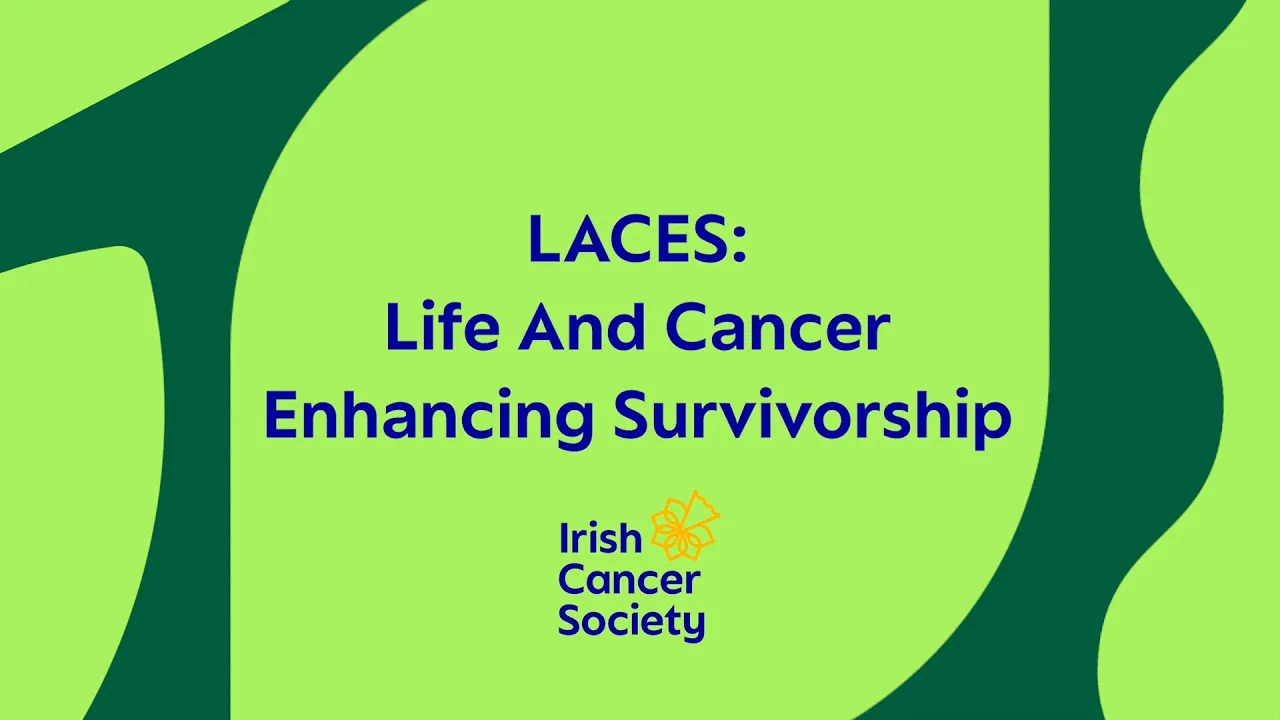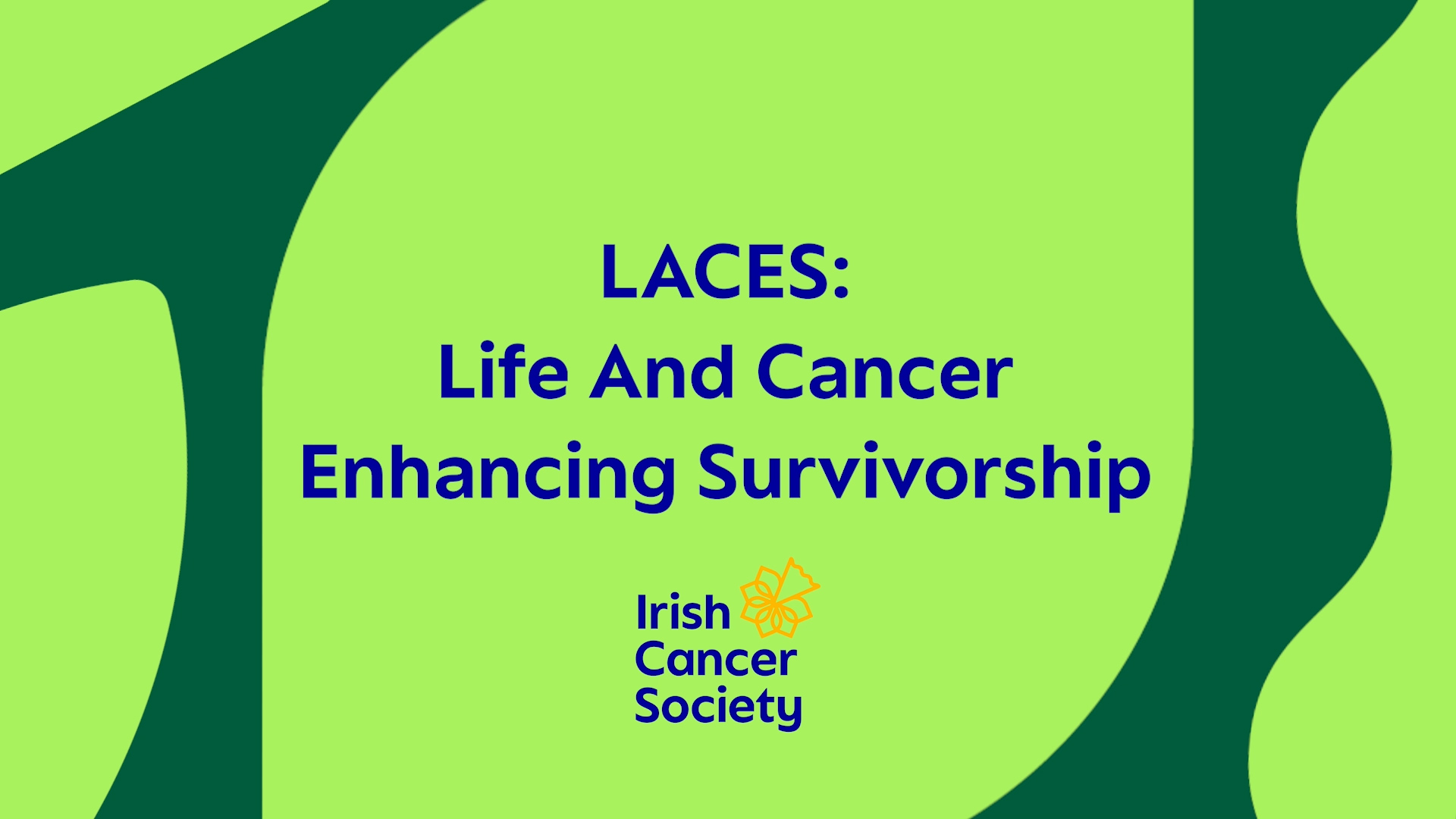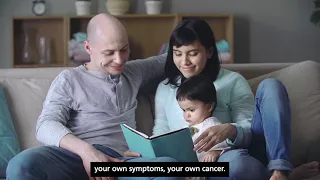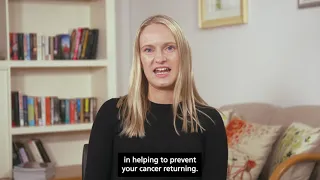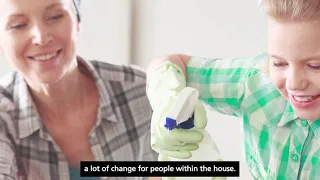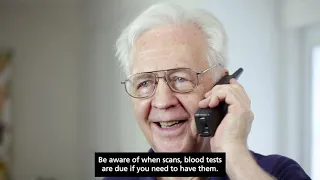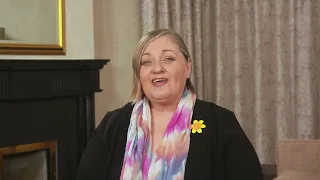LACES 5: Family finance
LACES: Life And Cancer - Enhancing Survivorship. A workshop from the Irish Cancer Society. Part 5: Family finance
0:01
LACES, Life And Cancer - Enhancing Survivorship Workshop.
0:14
Module 5: Family finance and Work life – In this module we will highlight the financial reality of cancer and point you towards information about entitlements and benefits.
0:29
Question: What is your advice for a family who have received a cancer diagnosis?
0:35
I think initially, obviously, when somebody has a new cancer diagnosis, there's a lot of shock and upset in relation to the diagnosis. The changes that occur in terms of work finances, family relationships can be fairly major depending on where people are in their own lives and what the particular circumstances are.
0:58
Question: What differences might we see in our family situation?
1:05
Some of the changes obviously would be changes in roles, sometimes people might have been the main provider at home and they now need care. They might have provided specific tasks in the house and now they need other people to do those, so that can involve a lot of change for people within the house.
1:24
Obviously sometimes people are living on their own, and they may not have much family support, and that also means that it can be difficult to manage. One of the things then for people is to try and find the coping strategies that they might have used in other situations to bring to this situation, so that then they can find the strength to deal with what's happening to them at this particular time.
1:48
Question: Can you tell us more about the financial impact of cancer?
1:54
So essentially, if people are employees, there's usually a fairly structured system when they need to go out sick with a critical illness which is what a cancer diagnosis is. Usually, they get a social welfare payment called ‘illness benefit’.
2:11
They also need to check very carefully with their employer as to what the employer's sick policy is because people can also be entitled to sick pay from work, and there can also be income protection which means that people can essentially get a lot of their salary paid while they're out sick.
2:31
They also need to check very carefully if they have any insurance policies that cover critical illness. Because this also can have an impact especially in relation to mortgages or any loans that they might have.
2:44
Question: What can I do if I’m not working or self-employed?
2:50
For people who aren't working, they are usually on a payment of some kind from the social welfare service. So, they need to check if they can stay on that payment or if, in fact, they need to move on to either a sickness disability allowance or another social welfare payment.
3:07
For people who are self-employed, they need to look very carefully at any health insurance, any income insurance that they have because when people are self-employed, often they're not entitled to the same payments as an employee.
3:24
This can have a profound impact depending on the type of work that they do, and it can also mean that any payment that they then subsequently get can be means tested, which can be a very difficult process.
3:37
Not all entitlements are means tested for employees. When you pay PRSI contributions through your PPS number, a lot of your payments come as of right through your payment because you're paying in as part of your work.
3:51
If you're not working then a lot of the allowances are means tested, and also if you're self-employed and you haven't got any private insurance cover, a lot of your payments will be means tested.
4:03
So, it's really important to check with your Intreo or social welfare office as to what level of entitlement you have.
4:11
Question: I have no idea what I’m entitled to. Where can I find out?
4:17
For people who are starting out, who don't know, the first port of call really should be the social welfare or Intreo office, which usually there's one based in most of the major towns around the country. They also can access citizens advice information centres which are really helpful in terms of helping people to figure out which payment they might be eligible for.
4:43
Also, the Irish Cancer Society support centres, the Daffodil Centres, the social work service in most of the major hospitals in the country where people are diagnosed would also be able to offer support.
4:56
One of the important things, obviously, is for people to get the correct information that applies to them. So, there are websites like welfare.ie, the HSE websites, and also the information pack which will be given out in relation to this course would be really important.
5:15
Question: Are carers entitled to payments?
5:21
When anybody is out sick and they need a lot of help and support, their relatives or anybody looking after them can also apply for a payment.
5:31
And there's two main payments, there's Carers Benefit, which is linked through anybody who's working, who wants to take time out to look after somebody. They get what's called a Carer's Benefit and that is usually with the agreement of their employer and it has to be pre-agreed before they leave their work. They can get it for up to 2 years.
5:52
The other is a Carer's Allowance, which is a payment paid through social welfare. Where somebody is providing full-time care for somebody who is sick, and that's a means tested payment.
6:05
Question: Is there any coverage for medical expenses?
6:11
Essentially, in terms of your medical cover and your medical expenses, there are a number of different routes that people can go down. Obviously, if people have private health insurance, they can access that directly through their provider and they need to check that out.
6:26
People often wonder about medical cards, and medical cards are not automatic with a cancer diagnosis. Sometimes people would have thought that in the past. There is a financial assessment. The applications are readily available through the HSE and they can talk to their GP about getting them signed.
6:49
Question: What do I do to get a drugs payment card?
6:55
The drugs payment card is available to everyone, once you have a PPS number and you're ordinarily resident in Ireland. People pay the first €114 a month, and everything over that is covered.
7:09
For people who have private health insurance, obviously they need to link with their provider in relation to their level of cover, and what services this gives them access to, both in the public and the private hospitals.
7:21
Even if people have private health insurance, they may also be eligible for either a medical card, drugs payment card, and they should check this out.
7:32
Question: I am running into difficulty financially. who can help me?
7:38
If people are paying a mortgage and they're running into financial difficulty, they should check with their provider, they may have a protection policy or also, they may be able to renegotiate their payments. Most lending agencies would be sympathetic when people have a critical illness and it's important to contact them directly.
7:58
Many of the hospitals providing cancer services also have a dedicated social work department, and it would be important for people to ask to be seen by a social worker if they're having financial difficulty or if they need advice and support.
8:17
Question: Do you have any advice about going back to work?
8:23
So, in terms of returning to work, I suppose it's important to say that most people return to work and most employers are very supportive of people returning to work after a critical illness.
8:37
It's important for people to keep all of their options open, not to make any major decisions until they see how they're readjusting in relation to their work.
8:47
Obviously, returning to work can be a daunting experience. We usually give advice in relation to people returning on a phased basis, looking at what type of work they're doing, the type of setting it is, whether it's indoor, whether it's outdoor. It's also important whether people are driving, using machinery, because this will have an impact then on whether they can return to work safely.
9:16
If you are returning to work as an employee, it's important that you're aware of your rights. In relation to your return to work it can also be very useful to look at employee assistance programmes.
9:30
Contacting your union rep, looking at flexible working arrangements, looking at working from home, and also what technology might be used in relation to supporting people so that they have flexibility around hospital appointments, or side-effects of treatment with still being able to do some work.
9:54
For more information, please visit www.cancer.ie/LACES
LACES: Life And Cancer – Enhancing Survivorship playlist
